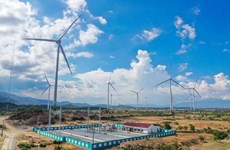Forum seeks to improve economy’s competitiveness
Enhancing the efficiency and
competitiveness of Vietnam’s economy topped the agenda of the Vietnam
Business Forum which was held in Hanoi on May 26.
Enhancing the efficiency and
competitiveness of Vietnam’s economy topped the agenda of the Vietnam
Business Forum which was held in Hanoi on May 26.
Government officials, businesspeople and representatives from a number of international organisations discussed a wide range of issues related to infrastructure, human resources development, and administrative, legal and tax reforms.
Vietnam’s Minister of Planning and Investment Vo Hong Phuc, World Bank Country Director in Vietnam Victoria Kwakwa and the International Finance Corporation (IFC)’s Regional Director Simon Andrew were optimistic about the Vietnamese economy’s current indexes, saying that Vietnam remains an attractive destination for foreign investors.
They also pointed out a number of challenges Vietnam needs to deal with to enhance the efficiency and competitiveness of its economy, especially those regarding laws, administrative procedures, infrastructure and personnel training.
The WB official pledged to support Vietnam’s reforms and expected to join in working out its socio-economic development plans when the country has much to do in the post-crisis period.
A representative from the European Chamber of Commerce (EuroCham) in Vietnam said the biggest challenge for Vietnam in the remaining months of 2010 is to balance its growth rate, while curbing inflation.
The EuroCham representative expressed belief in huge potentials of Vietnam – a leading nation in the region and a destination for investors from Europe .
President of the American Chamber of Commerce in Vietnam Jocelyn Tran suggested the country improve skills of its workforce. Vietnam also should make greater efforts to stabilise the macro-economy, legal system and labour relations, promote the protection and enforcement of intellectual property rights, and speed up infrastructure development, she said.
Hiroyuki Moribe, Head of the Japan External Trade Organisation (JETRO)’s Hanoi Office, said Vietnam is still an appealing destination and a potential market for Japanese investors thanks to its political and social stability.
Vietnam sees the highest rate of Japanese companies which are planning to expand business as compared with other member countries of the Association of Southeast Asian Nations (ASENA), Hiroyuki said.
While sharing concerns about the establishment of private economic groups and impacts of the ASEAN-China Free Trade Agreement, the Vice President and General Secretary of the Vietnam Young Entrepreneurs Association, Dr. Nguyen Manh Cuong, put forth specific solutions to help the youth to set up shop.
Cuong emphasised the necessity to provide young people in rural areas with access to Internet and chances to meet with successful young entrepreneurs, as well as encourage the youth to enrich themselves./.
Government officials, businesspeople and representatives from a number of international organisations discussed a wide range of issues related to infrastructure, human resources development, and administrative, legal and tax reforms.
Vietnam’s Minister of Planning and Investment Vo Hong Phuc, World Bank Country Director in Vietnam Victoria Kwakwa and the International Finance Corporation (IFC)’s Regional Director Simon Andrew were optimistic about the Vietnamese economy’s current indexes, saying that Vietnam remains an attractive destination for foreign investors.
They also pointed out a number of challenges Vietnam needs to deal with to enhance the efficiency and competitiveness of its economy, especially those regarding laws, administrative procedures, infrastructure and personnel training.
The WB official pledged to support Vietnam’s reforms and expected to join in working out its socio-economic development plans when the country has much to do in the post-crisis period.
A representative from the European Chamber of Commerce (EuroCham) in Vietnam said the biggest challenge for Vietnam in the remaining months of 2010 is to balance its growth rate, while curbing inflation.
The EuroCham representative expressed belief in huge potentials of Vietnam – a leading nation in the region and a destination for investors from Europe .
President of the American Chamber of Commerce in Vietnam Jocelyn Tran suggested the country improve skills of its workforce. Vietnam also should make greater efforts to stabilise the macro-economy, legal system and labour relations, promote the protection and enforcement of intellectual property rights, and speed up infrastructure development, she said.
Hiroyuki Moribe, Head of the Japan External Trade Organisation (JETRO)’s Hanoi Office, said Vietnam is still an appealing destination and a potential market for Japanese investors thanks to its political and social stability.
Vietnam sees the highest rate of Japanese companies which are planning to expand business as compared with other member countries of the Association of Southeast Asian Nations (ASENA), Hiroyuki said.
While sharing concerns about the establishment of private economic groups and impacts of the ASEAN-China Free Trade Agreement, the Vice President and General Secretary of the Vietnam Young Entrepreneurs Association, Dr. Nguyen Manh Cuong, put forth specific solutions to help the youth to set up shop.
Cuong emphasised the necessity to provide young people in rural areas with access to Internet and chances to meet with successful young entrepreneurs, as well as encourage the youth to enrich themselves./.













